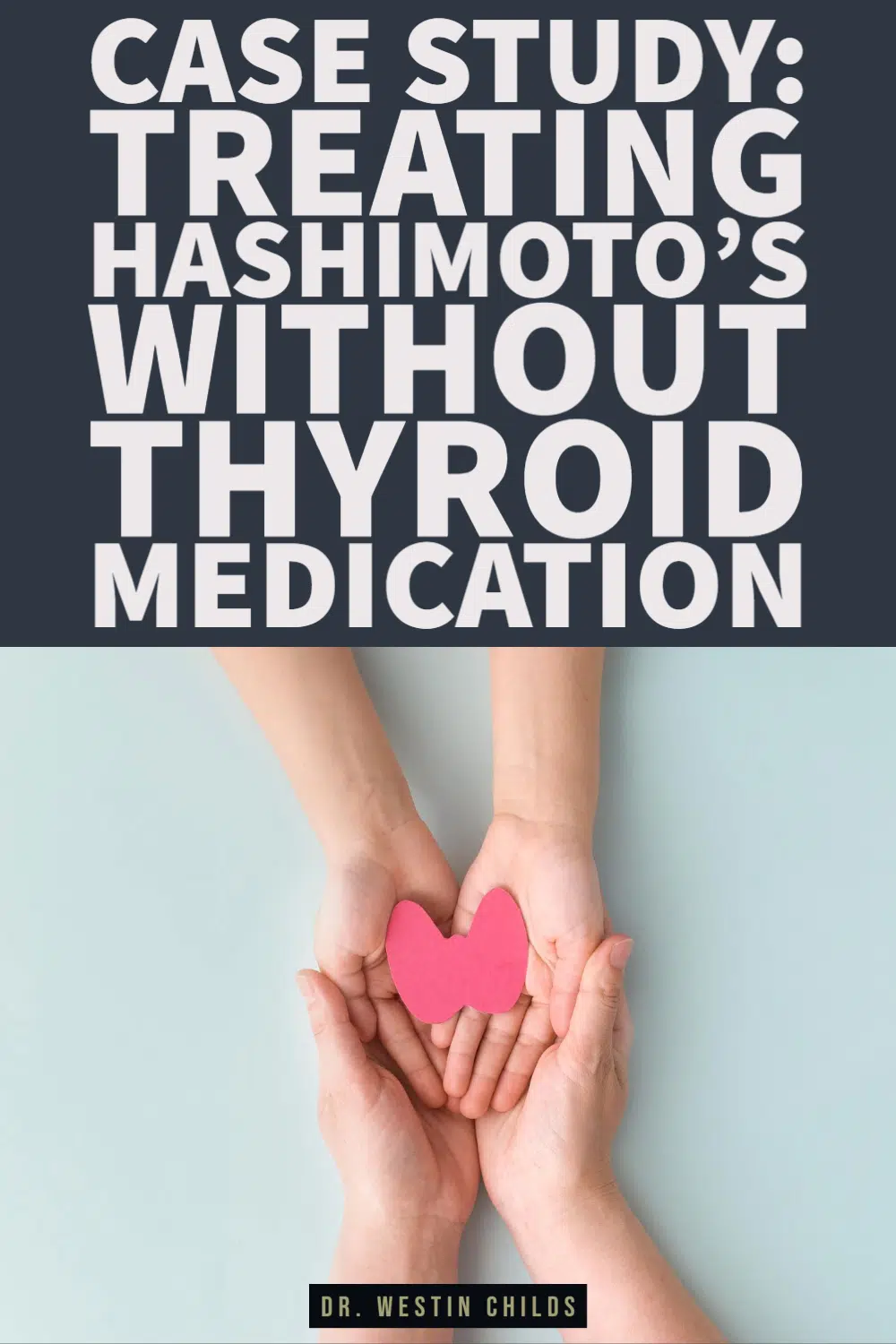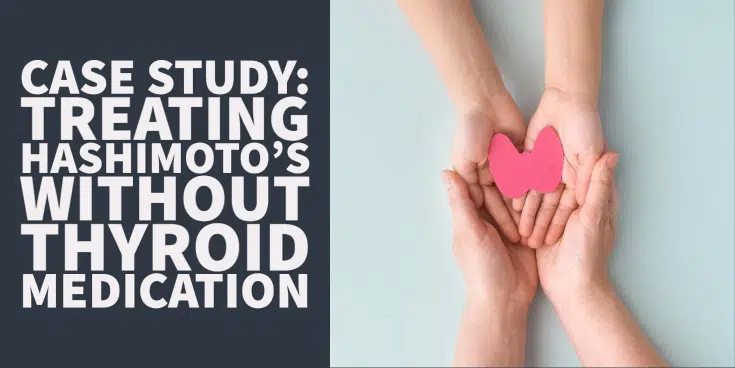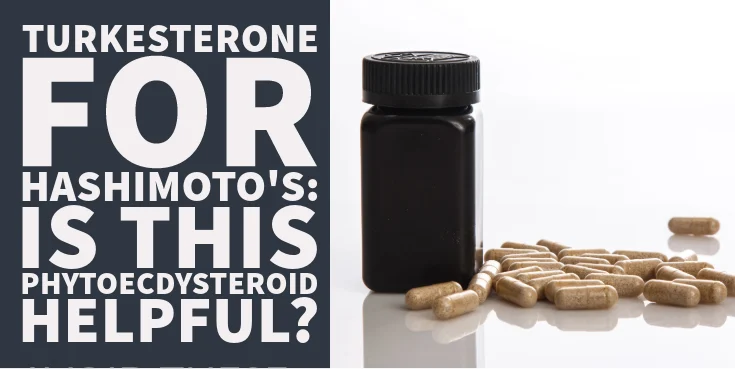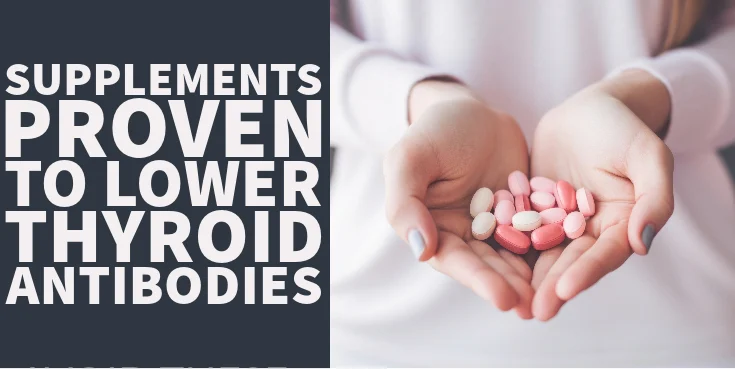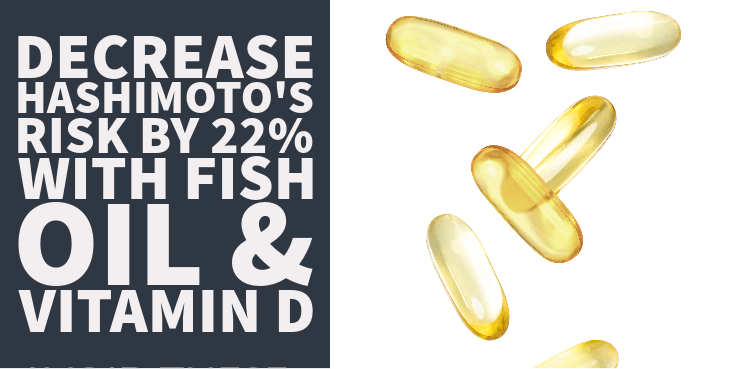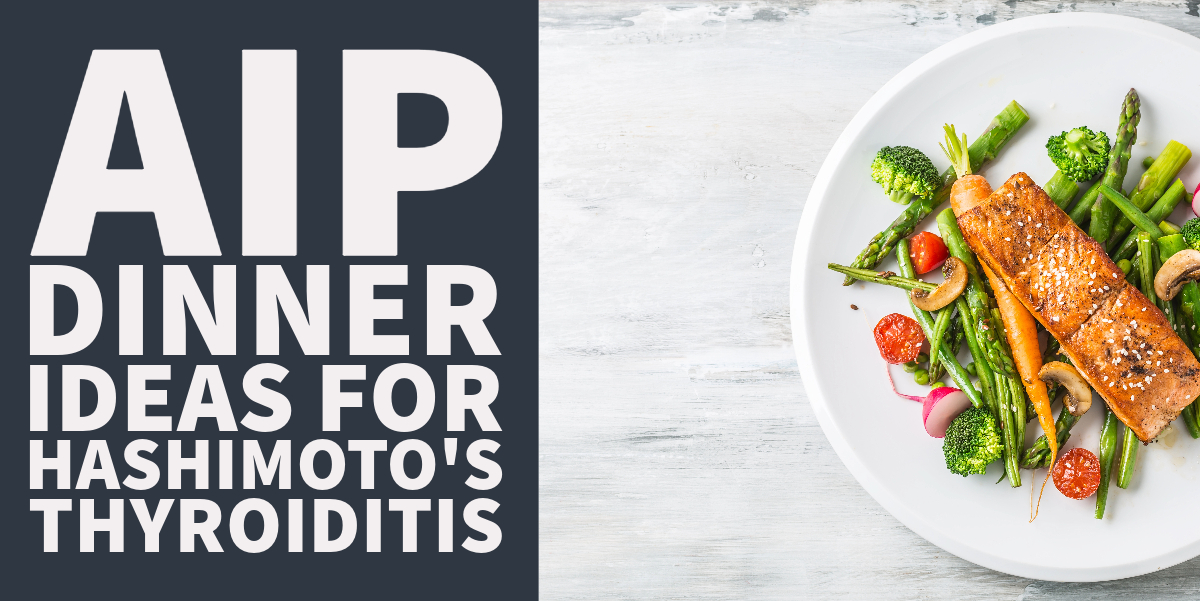Treating Hashimoto’s without Thyroid Medication
Every single day patients with Hashimoto’s reach out to me asking about natural therapies.
These questions all have one thing in common:
They want to know if there is some alternative to thyroid medication or if it’s possible to completely avoid using it.
My answer is always something like this:
I’ve personally seen many patients with Hashimoto’s put their disease state into remission with the use of various therapies.
Sometimes that requires medications, sometimes it requires hormones, and sometimes it can be done with just natural treatments like supplements, diet, exercise, and so on.
It’s one thing for me to just verbally tell you that this is possible, but it’s a completely different story when you see it with your own eyes.
Today we are going to walk through a case study of a Hashimoto’s patient, Jennifer, who was able to completely manage her Hashimoto’s without the help of a doctor and with the use of natural therapies.
This is not someone that I have treated or had any contact with and I did not personally help her throughout her journey.
She was able to manage her Hashimoto’s by herself through reading and research, which is incredible.
The only reason I know about her situation is because she left this review on one of my products:
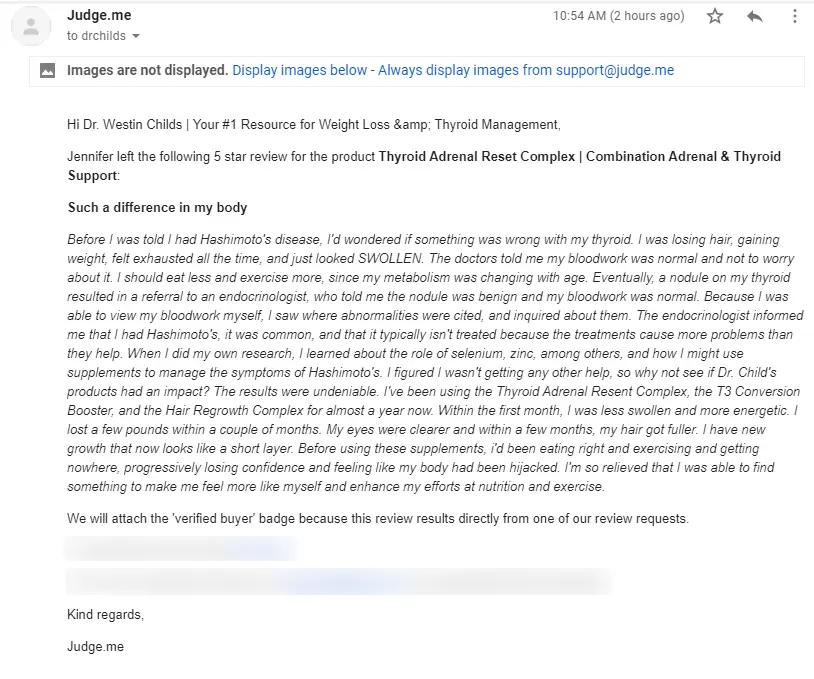
When I saw this I reached out to her and asked her for some more information so that I could share it with everyone here.
I know there are a ton of you out there reading this who aren’t getting the help that they need from their physician and may feel alone or overwhelmed.
This story of Jennifer’s experience shows what’s possible with the right resources and the right attitude.
It’s hard when you hear from your doctor that Hashimoto’s is not a reversible condition and that it’s something that you will have to deal with for the rest of your life.
And while it may not be reversible in EVERY case, there are almost always things that you can do to dramatically improve your symptoms and help you live your best life.
And this case study is a perfect example of just that.
In this post, I will walk you through…
- How Jennifer was able to manage her Hashimoto’s without help from her doctor
- The one thing that she focused on which helped her feel better the fastest
- What changes she made to her exercise routine and her diet
- What supplements helped her the most
- And much more
DOWNLOAD FREE RESOURCES
Foods to Avoid if you Have Thyroid Problems:
I’ve found that these 10 foods cause the most problems for thyroid patients. Learn which foods you should avoid if you have thyroid disease of any type.
The Complete List of Thyroid Lab tests:
The list includes optimal ranges, normal ranges, and the complete list of tests you need to diagnose and manage thyroid disease correctly!
Hashimoto Triggers are Unique (and so is treatment!)
Let me first start off by saying that each case of Hashimoto’s is unique.
What does that mean?
Well, it means that the cause and severity of each case largely depend on the person and their circumstances.
If we lined up 10 people with Hashimoto’s and really dug into their history we would find that no two cases are exactly the same.
While all 10 of them would technically have the same disease, the reason(s) that they have the disease would be different for each person.
And we would find differences in important things like:
- What age their Hashimoto’s began
- The severity of their symptoms
- The fluctuation of their symptoms over time
- Other medical problems and conditions that they may have
- Other autoimmune diseases that they may suffer from
- How long they have had Hashimoto’s
- The type of foods that they can and can’t tolerate
- How much fat, carbohydrates, and protein they need each day
- Other hormone levels such as testosterone, DHEA, and estrogen
- The status of their gut health
- And so on
Each of these things would be different and they ALL matter.
Why am I bringing this up?
Because I want you to understand that when we talk about this particular patient she may or may not be similar to your situation.
And just because something worked for her does not guarantee that it will (or won’t) work for you.
So keep that in mind as you read through her story!
What worked for Jennifer
Her story is probably not much different from many of you.
Her symptoms started around the time she turned 40.
This is a very common age when women start to experience hormone problems!
Thyroid symptoms are commonly triggered around this age range as female sex hormones start their inevitable decline.
We know that many hormones decline with age but these hormones are not all declining at the same rate.
Starting at around age 35, progesterone levels start to fall at a faster rate compared to estrogen.
This decline can often lead to a relative imbalance in the estrogen-to-progesterone ratio and may be the precipitating cause of many hormone issues.
This trend continues all the way through menopause where progesterone and estrogen fall to an almost undetectable level.
This change in both estrogen and progesterone seems to uncover thyroid problems for many women either by causing the problem directly or by putting the body in a vulnerable position.
Women also start to experience a decline in their metabolism around this time period and this slowing down of the metabolism is often exacerbated in the presence of thyroid problems.
As a result, weight gain during this time period is not uncommon and is one of the first signs of thyroid problems.
In Jennifer’s own words:
“Sometime after I turned 40, I started to wonder if I was experiencing thyroid problems. I was tired, swollen-looking, and was losing a lot of hair. I was told by my physicians that my bloodwork was within normal limits and it was likely due to aging and the slowing of my metabolism. I was discouraged and couldn’t help but wonder what I was doing wrong. I made efforts to exercise and eat right, but nothing improved.
In fact, I consistently gained weight. When a routine ultrasound found a large nodule on my thyroid and I was referred to an endocrinologist, I was told by this physician that the nodule was benign and my bloodwork looked good. Because I’d seen my bloodwork myself and saw abnormalities cited, I inquired about them. The endocrinologist answered that the bloodwork in fact indicates Hashimoto’s, but he didn’t recommend any treatment because, he said, “the treatment only seems to make things worse.”
I did my own research online, reading information and watching videos posted by holistic physicians and naturopaths, and learned more my body’s hormones and supplements, and dietary changes that might help. At that point, I came across Dr. Childs’ website and thought I’d try what he was recommending, since I had no treatment thus far.
Interestingly, when I went back to the endocrinologist after only 6 months, my bloodwork no longer reflected Hashimoto’s, and the nodule on my thyroid had shrunk. My physician wasn’t curious about this at all. He said it just happens sometimes. I chose not to share what I had been doing.”
A couple of things should stand out to you:
- Her doctor told her that the changes she was experiencing were primarily due to age and getting older.
- She tried the conventional wisdom of “diet and exercise” but didn’t see success.
- Her doctor was dismissive of even medical therapies to treat Hashimoto’s.
If this doesn’t highlight the experience of most patients with Hashimoto’s then I don’t know what does.
I’ve lost count of the number of people who have told me these 3 things.
This is one of the reasons that I’ve lamented the current state of thyroid management.
The good news is that you don’t have to be alone because you can learn from situations such as hers.
What’s incredible about her story is that she was able to see significant improvement in several areas in a short period of time even without the help of her doctor.
Based on her story, we know that she was able to see:
- Her thyroid antibodies reduce to normal levels (effectively putting her Hashimoto’s into remission)
- The shrinking of her thyroid nodule (this isn’t always possible but it’s nice when it happens)
- Near-complete resolution in her symptoms
In addition, she was able to realize all of these improvements WITHOUT the use of thyroid medications like levothyroxine and Synthroid and with only natural therapies.

This is very important to note because many patients with Hashimoto’s notice a decline in how they feel once they start thyroid medication (some feel better, obviously, but this isn’t universal).
I’m not saying you should avoid thyroid medication if you have Hashimoto’s, by the way, I’m just saying that if your medication is dosed incorrectly it may make you feel worse.
But there are still plenty of patients with Hashimoto’s who do benefit from thyroid medications and some who even see a decline in thyroid antibodies with their use.
Having said that, if you can avoid the addition of thyroid medication to your regimen, by catching and treating Hashimoto’s early, it will be easier for you to regulate your thyroid.
Why?
Because you aren’t putting unneeded strain on your pituitary or hypothalamus which helps to regulate TSH and thyroid function in your body.
Let’s go back to her story for a minute:
I think one of the main reasons that Jennifer was able to see such a big improvement in a short period of time is because she focused on what was probably the major cause or trigger of Hashimoto’s in her body.
Jennifer states:
“I learned more about the role of cortisol in the body and the importance of keeping my stress down, and took stress-reduction MUCH more seriously. I started to see stress reduction as necessary for my health and not just for my comfort. This was a transformative paradigm shift for me.
I had already been eating lots of lean proteins and veggies, so I continued that. As a regular exerciser, I have always been motivated to work out. However, I used to engage in a lot of distance running (full marathons, half-marathons, etc.), but in recent years, I would be completely exhausted after running. A day with a long run required a nap.
I came across in my research how that might not be the best form of exercise for someone with Hashimoto’s because of the role of cortisol with that level of running. I have since switched to some running, but more HIIT and weight training, and I am no longer completely wiped out after a workout.”
There’s a lot to unpack here but let’s focus on what I believe is one of the primary drivers of Hashimoto’s:
Stress.
Stress is also one of the most underappreciated and often most ignored causes of Hashimoto’s.
In fact, I would go as far as to say that most cases of Hashimoto’s are triggered by stress in some form or another whether that be physical, emotional, social, or some combination of the three.
The more stress the body is under the more cortisol that is released and, eventually, the more suppressed your own immune system becomes.
And unless you target and manage this stress, the flames of Hashimoto’s will continue to burn.
Jennifer identified that much of her stress came from what sounded like overexercising.
And this is something that I commonly see among all types of thyroid patients because weight gain is something that almost all low thyroid patients suffer from.
But overexercising isn’t a solution to weight gain and, in fact, can actually cause more harm than good as it triggers high levels of cortisol and may even increase reverse T3.
If we go back to her original story, we know that diet and exercise didn’t help her much by themselves.
In fact, it was probably causing her more harm than good.
One of the main ways to know if you are overexercising is to monitor how you FEEL after you exercise.
Even though exercising should be challenging to your body, you should NOT feel exhausted after a workout and it should not take you several days to recover.
You should end your workout feeling refreshed and with more energy to take on your day afterward.
Some minor amount of fatigue is okay but crushing fatigue afterward is considered a bad sign.
If you have Hashimoto’s and you aren’t dealing with your stress levels then this is something that you should put immediate attention on.
You can help your body manage stress by using these types of therapies:
- Practicing meditation daily
- Taking adrenal glandulars and/or adrenal adaptogens
- Dry brushing
- Long-distance slow exercise (long walks at night are a great way to do this)
- FAR IR Sauna or polar plunges
- Consuming more carbohydrates later in the day and less in the morning
- Changing up your exercise routine to allow for more recovery time
- Improving the depth and duration of your sleep
- Findings hobbies outside of work
- Spending more time in nature
These treatments don’t sound very sexy which is why they are so often ignored but if you ignore them then you do so at your own peril!
You may see the biggest improvement in managing your Hashimoto’s by focusing solely on your stress levels.
Her Supplements and Diet
Of course, just managing stress levels is not all that Jennifer focused on.
She also spent time adjusting both her diet and her supplement regimen.
If you are serious about naturally managing Hashimoto’s, especially without thyroid medication, then changing up your diet and using supplements is a must.
Diet is one of the things that YOU have control over.
YOU control the foods you put into your body and the foods that you avoid.
YOU control how much you eat, when you eat, and when you stop.
This matters because you DON’T have control over what the doctor recommends to you.
You are at their mercy and their recommendations when it comes to prescription medications such as thyroid hormone.
But you do have control over your diet and the supplements you put into your mouth.
Jennifer states:
“I feel like I’m finally benefiting from an improved diet. Previously, I was eating right but seeing no results. I’m not swollen anymore!
Also, I get lots of compliments on my skin. My eyes are clearer. And my energy is GOOD. I really should drink less wine, since as alcohol is processed in the body, it releases cortisol, which I really don’t need.
But I eat lean protein, lots of plants, and nuts. I try to have fun with salads. I am a snacker and prefer salty and savory things. I would like to be a smarter snacker, say apples with peanut butter, or veggies with hummus.”
A quick thing worth mentioning here is the quality and appearance of her skin.
Your skin is an outward reflection of your inward health.
Healthy skin is always a great sign and something that you can use as a proxy measure for your overall health and even thyroid health.
In addition to her skin, Jennifer also mentions that she finally feels like she is seeing the results from her diet, even though she was eating healthy previously.
If you are someone who is eating “right” but not seeing results, then you are guaranteed to be missing something big in your own personal history.
Dieting (changing your diet to eat healthy foods) is a necessary therapy to improve your Hashimoto’s but it’s not likely to be enough on its own.
In fact, I’ve debunked the myth that diet can cure Hashimoto’s all by itself here.
I also wanted to highlight that while she was eating healthy, she also didn’t have to get very aggressive in her diet to see results.
Often, I will hear Hashimoto’s patients state that certain diets are better than others for treating autoimmune diseases.
The reality is that the best diet for Hashimoto’s depends on YOU.
And figuring that out will take some trial and effort.
Don’t think that you need to necessarily jump into an incredibly aggressive or restrictive diet such as the AIP diet right off the bat.
I’ve seen patients get results with all sorts of diets ranging from elimination-based diets, whole food-based diets, the carnivore diet, the ketogenic diet, and more.
Jennifer goes on to explain which supplements helped her the most:
“Currently, my treatment for Hashimoto’s includes three of Dr. Childs’ supplements: T3 Conversion Booster, Adrenal Reset, and Hair Growth Complex.
I also eat a couple of Brazil nuts every day, which are rich in selenium. That is all.”
Jennifer saw really great results without using very many supplements.
I should point out here that this isn’t always common.
Most of the time, patients will need to go through a variety of different supplements to replace lost nutrients, repair adrenal health, optimize thyroid function, and improve gut health.
While her regimen wasn’t that intense, we can still learn a few things from it:
- T3 Conversion Booster – This product helps improve T4 to T3 conversion as well as thyroid receptor sensitivity. T3 is the most powerful thyroid hormone and placing a priority on creating more of it is almost always a good idea.
- Thyroid Hair Regrowth Complex – This product helps improve hair growth in thyroid patients by providing the hair follicles with specific nutrients such as silicon and choline.
- Thyroid Adrenal Reset Complex – This product helps target adrenal function and thyroid function, reduces inflammation, and helps improve stress resilience.
- Brazil nuts – These provide a natural source of selenium. Selenium is important for protecting your thyroid gland, reducing thyroid gland inflammation, and assisting with thyroid conversion.
Had I been involved in her treatment at all, I would have recommended a few additional supplements such as a good probiotic to help improve gut health and a D3 supplement to help improve immune function.
Many, if not all, cases of Hashimoto’s are associated with low Vitamin D levels.
In addition, Hashimoto’s is often triggered by damage to the gut lining which results in inflammation and further damage to thyroid function.
Addressing both is always a good idea for patients with Hashimoto’s.
Otherwise, her supplement regimen is spot on given her situation and history.
Treating Early Stage Hashimoto’s vs Late Stage Hashimoto’s
I also want to take a second to explain the difference between early-stage Hashimoto’s and late-stage Hashimoto’s.
Many of you reading this, especially those with Hashimoto’s, will find that you are in different stages of your disease.
Some will have been recently diagnosed with Hashimoto’s because they just started experiencing thyroid problems.
Other patients have been experiencing symptoms for years and have been diagnosed with thyroid problems but don’t even know they have Hashimoto’s yet because their doctor hasn’t tested their thyroid antibodies (make sure you get tested!).
Others still have had Hashimoto’s for decades.
While each category of people listed above all have the same disease they are not in the same stage.
And this stage can dramatically impact how likely you are to put your Hashimoto’s into remission and what you should expect in terms of treatment.
It is ALWAYS in your best interest to catch Hashimoto’s as early as possible and be as aggressive as possible to try and reverse it as soon as you know that you have it.
That’s the key here.
The longer you wait to get diagnosed, the longer you wait to change your diet once you know you have Hashimoto’s, the longer it takes your doctor to order the right tests, the more damage that will be done to your thyroid gland and the HARDER it will be to treat and reverse your condition.
The reverse is also true.
The sooner you start treatment the more likely you are to have a favorable result.
So if you are someone with Hashimoto’s and you haven’t been aggressive in the therapies and treatments that you are using, now is the time!
Get familiar with natural treatments and get started on them as soon as possible.
You can use these resources from my blog to help:
- Hashimoto’s diet guide
- Natural therapies for Hashimoto’s
- Supplements for Hashimoto’s
- LDN for Hashimoto’s
- Thyroid medication guide
Final Thoughts
Treating Hashimoto’s naturally and by yourself is absolutely possible.
It won’t be possible for everyone but that doesn’t mean you shouldn’t try.
The standard of care for “treating” Hashimoto’s by conventional doctors is to let the autoimmune disease damage the thyroid gland until thyroid medication is required.
But if you can catch your disease early and make targeted and specific changes to your lifestyle and routine, you can impact the course of your disease.
Jennifer is a perfect example of this.
She was able to put her Hashimoto’s into remission all on her own with some research, trial and error, and time.
Now I want to hear from you:
Do you have Hashimoto’s? If so, what types of treatments have you tried?
Have you had any success putting your Hashimoto’s into remission?
Are you currently taking thyroid medication? Are you trying to get off of it?
Do you think stress is contributing to your condition?
Leave your questions or comments below!
